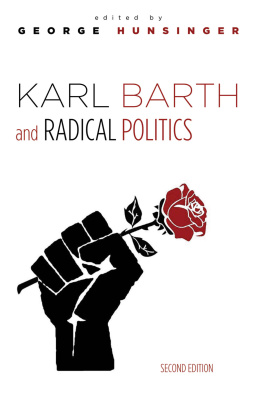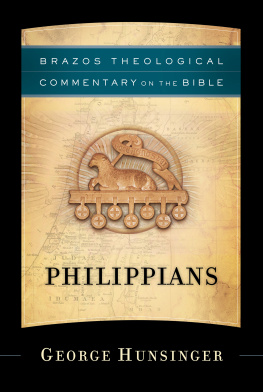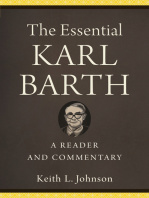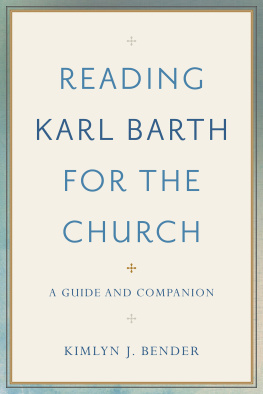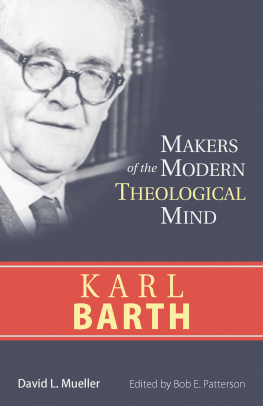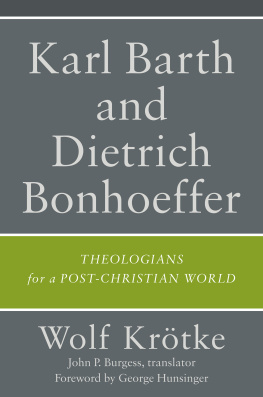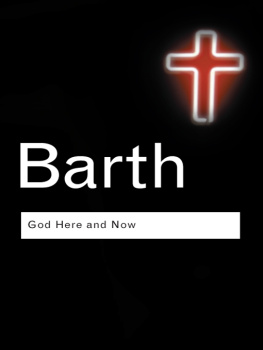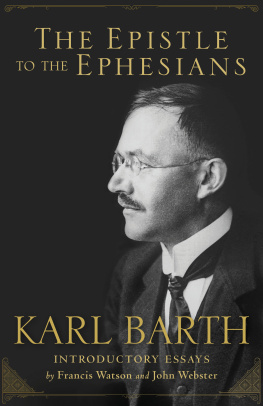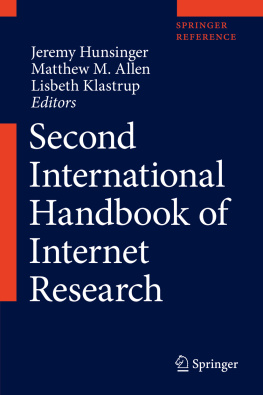George Hunsinger - Karl Barth and Radical Politics
Here you can read online George Hunsinger - Karl Barth and Radical Politics full text of the book (entire story) in english for free. Download pdf and epub, get meaning, cover and reviews about this ebook. year: 2017, publisher: Cascade Books, an Imprint of Wipf and Stock Publishers, genre: Religion. Description of the work, (preface) as well as reviews are available. Best literature library LitArk.com created for fans of good reading and offers a wide selection of genres:
Romance novel
Science fiction
Adventure
Detective
Science
History
Home and family
Prose
Art
Politics
Computer
Non-fiction
Religion
Business
Children
Humor
Choose a favorite category and find really read worthwhile books. Enjoy immersion in the world of imagination, feel the emotions of the characters or learn something new for yourself, make an fascinating discovery.
- Book:Karl Barth and Radical Politics
- Author:
- Publisher:Cascade Books, an Imprint of Wipf and Stock Publishers
- Genre:
- Year:2017
- Rating:4 / 5
- Favourites:Add to favourites
- Your mark:
- 80
- 1
- 2
- 3
- 4
- 5
Karl Barth and Radical Politics: summary, description and annotation
We offer to read an annotation, description, summary or preface (depends on what the author of the book "Karl Barth and Radical Politics" wrote himself). If you haven't found the necessary information about the book — write in the comments, we will try to find it.
Karl Barth and Radical Politics — read online for free the complete book (whole text) full work
Below is the text of the book, divided by pages. System saving the place of the last page read, allows you to conveniently read the book "Karl Barth and Radical Politics" online for free, without having to search again every time where you left off. Put a bookmark, and you can go to the page where you finished reading at any time.
Font size:
Interval:
Bookmark:
Second Edition
Edited and Translated by
George Hunsinger

Karl Barth and Radical Politics
Second Edition
Copyright 2017 George Hunsinger. All rights reserved. Except for brief quotations in critical publications or reviews, no part of this book may be reproduced in any manner without prior written permission from the publisher. Write: Permissions, Wipf and Stock Publishers, W. th Ave., Suite , Eugene, OR 97401 .
Cascade Books
An Imprint of Wipf and Stock Publishers
W. th Ave., Suite
Eugene, OR 97401
www.wipfandstock.com
paperback isbn: 978-1-5326-0394-5
hardcover isbn: 978-1-5326-0396-9
ebook isbn: 978-1-5326-0395-2
Cataloguing-in-Publication data:
Names: Hunsinger, George, editor and translator.
Title: Karl Barth and radical politics, nd ed. / edited and translated by George Hunsinger.
Description: Eugene, OR: Cascade Books, 2017 .
Identifiers: isbn 978-1-5326-0394-5 ( paperback ) | isbn 978-1-5326-0396-9 ( hardcover ) | isbn 978-1-5326-0395-2 ( ebook ).
Subjects: LCSH: Barth, Karl, 1886 1968 | Socialism and religion.
Classification: BX4827 B3 K34 2017 ( print ) | BX4827 ( ebook ).
Manufactured in the U.S.A. October 23, 2017
The first edition of this volume was published in 1976. This second edition includes not only a new Preface, but also three additional essays of mine relating to Barths relevance to human rights, liberation theology, and Ren Girards theories on violence and scapegoating. It is my hope that readers will find this new edition of increased interest and usefulness in the theological dialogue concerning the gospels addressing contemporary issues of human need.
I have continued to write on Barths theology over the years, as well as continuing the conversation in my roles as director of the Center for Karl Barth Studies (19972001) and president of the Karl Barth Society of North America. Some of my other relevant books include: How to Read Karl Barth: The Shape of His Theology (1991); Disruptive Grace: Studies in the Theology of Karl Barth (2000); Evangelical, Catholic, and Reformed: Doctrinal Essays on Barth and Related Themes (2015); and Conversational Theology: Essays on Ecumenical, Postliberal, and Political Themes, with Special Reference to Karl Barth (2015). I have also edited For the Sake of the World: Karl Barth and the Future of Ecclesial Theology (2004) and Torture Is a Moral Issue (2008), as well as the forthcoming Blackwell Companion to Karl Barth (2 vols.).
George Hunsinger
During 1972 , as I was studying at the University of Tbingen, a fascinating debate got under way about the influence of socialist politics on the theology of Karl Barth. The files which became accessible after Barths death in 1968 disclosed that during his early ministry in Safenwil, Barth was much more active in the socialist movement than had generally been recognized and that in some sense he remained self-consciously a socialist for the rest of his life. The point at issue was whether or not Barths socialist commitment had had a decisive impact on the shape of his later theology. Although it seemed to me that it had, once the connection was pointed out, competent Barth scholars were raising serious objections to any such view, and the matter seemed far from settled. After returning to the United States, I continued to follow the debate and was surprised that relatively little attention was being paid to it in the English-speaking world. Before long it occurred to me that a translation of some of the principal articles of the controversy might make an interesting and informative volume. The collection at hand contains a representative sample not only of the debate itself but also of the early socialist views which, I am now convinced, were to become absolutely crucial to both the development of Barths thought and the final shape of his theology. Barths theological work cannot fully be appreciated at any stage apart from his socialist commitment.
One cautionary word may be in order to readers in the English-speaking world. Barth never conceived of socialism as an ideology or a system of ideas. For him socialism was, rather, a series of concrete goals with strong affinities to the kingdom of God. Strictly speaking, therefore, the primary relationship which Barth saw was not between theology and socialism, but rather between the gospel and socialism, or better, between the freedom and love of the living God and socialism. Consequently, Barth did not set out to prove a logical relationship between theology and socialism, as between one set of ideas and another, any more than he attempted to prove the mystery of the incarnation. If theology was a secondary reflection on the concrete reality of God as proclaimed in the gospel, then socialism commended itself to theology to the extent that socialist goals conformed to those of God for the world. Theology is the conceptual clarification, not the logical deduction, of those goals. The relationship of theology to socialism, therefore, is not the relationship of theory to theory, but rather of theory to praxis.
I would like to acknowledge my indebtedness to the many people who helped make this book possible. I am especially grateful to Prof. Friedrich-Wilhelm Marquardt, who supplied invaluable assistance and support. Above all, my adviser at Yale, Prof. Hans Frei, a Doktorvater in the true sense of the term, gave generously of his time, work, and encouragement at every stage of the way. Responsibility for the final product is, of course, my own. I dedicate this book to the memory of my father, who once for a brief time thought he was a socialist, who suffered as a human being, and who died, with questions in his heart, as a Christian.
When this voume was first published over years ago, there were at least two things I had not anticipated. One had to do with the prospects for democratic socialism in America, the other with the place of socialism in the historical development of Karl Barths theology. The first was a matter of chastened optimism, the second of vincible ignorance.
Democratic socialism of course has never had great prospects in America. It has always been more nearly aspirational than feasible. Its history has been essentialy a history of defeats. It is a history, as one commentator puts it, of the vanquished. Yet when faced with the enormity of human sufferingas promoted by privileged elites through through cruel engines of social miseryit has at least offered an antidote, however small, to despair. H. L. Mencken, of all people, seems to have grasped this point when he wrote:
The notion that a radical is one who hates his country is nave and usually idiotic. He is, more likely, one who likes his country more than the rest of us, and is thus more disturbed than the rest of us when he sees it debauched. He is not a bad citizen turning to crime; he is a good citizen driven to despair.
I turned to socialism in my youth when I asked about the early critics of the Vietnam War. It turned out that almost all of them were socialists. At about the same time, upon graduating from college, I lived and worked in the Black ghetto section of Bedford-Stuyvesant, where I taught in a store-front school for high school drop-outs. The question of how to allieviate racism and the misery accompanying it became urgent for me. Again it was democratic socialism that seemed to offer not only the most trenchant analysis, but also the greatest hope for a program that would truly combat these evils.
Font size:
Interval:
Bookmark:
Similar books «Karl Barth and Radical Politics»
Look at similar books to Karl Barth and Radical Politics. We have selected literature similar in name and meaning in the hope of providing readers with more options to find new, interesting, not yet read works.
Discussion, reviews of the book Karl Barth and Radical Politics and just readers' own opinions. Leave your comments, write what you think about the work, its meaning or the main characters. Specify what exactly you liked and what you didn't like, and why you think so.

